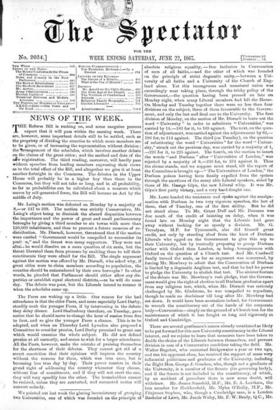Mr. Laing's motion was defeated on Monday by a majority
of 8,—or 247 to 239. The motion was strictly Conservative, Mr. Laing's object being to diminish the absurd disparities between the importance and the power of great and small parliamentary boroughs by giving a third member to six towns with more than 150,000 inhabitants, and thus to prevent a future measure of re- distribution. Mr. Disraeli, however, threatened that if the motion were carried " Government would be compelled to reconsider its posit - sn," and the threat won many supporters. They were not afrais- he would dissolve on a mere question of six seats, but the threat liberated them from pressure by enabling them to tell their constituents they were afraid for the Bill. The single argument against the motion was offered by Mr. Disraeli, who asked why, if great cities were to claim members according to population, the counties should be outnumbered by their own boroughs ? In other words, he pleaded that Parliament should either allow any dis- parities or establish equal electoral districts,—as he will do some day. The debate was poor, but the Liberals intend to.resume it when the schedules come up.






























